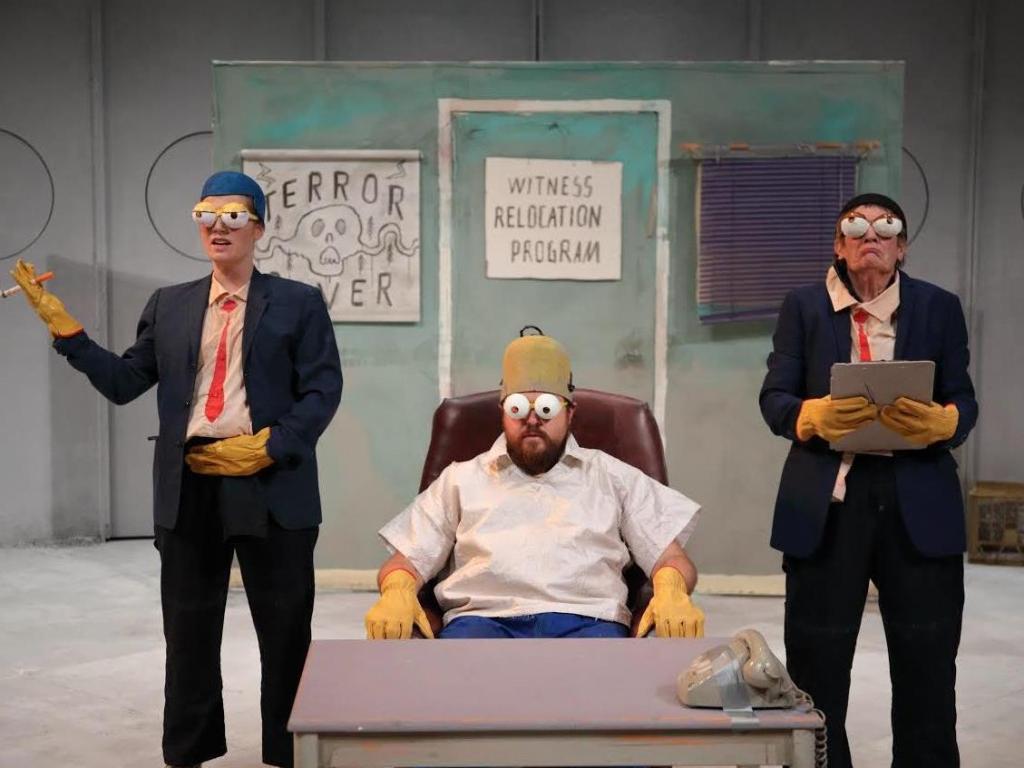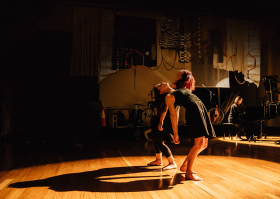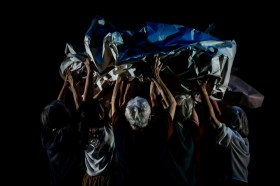Photo by Tony Lewis. Image: supplied.
Art will be made and stories told, even in the ruins of the world. It’s a notion that’s been explored in countless classics down the years, including Giovanni Boccaccio’s Renaissance novel The Decameron and Ray Bradbury’s Atomic Age sci-fi favourite, Fahrenheit 451.
One of the latest plays to explore the enduring power of art in the face of disaster is Anne Washburn’s ‘post-electric play’, Mr Burns – opening at Belvoir’s Upstairs Theatre in May – though it does so in a uniquely theatrical way.
On the surface, Mr Burns celebrates the art of the story – in this particular instance a much-loved episode of The Simpsons which in itself references everything from the 1962 film noir Cape Fear to Gilbert and Sullivan’s HMS Pinafore – in a post-apocalyptic world, but it’s also possible to see deeper resonances in the work.
‘It is, in a sense, looking at something like Chinese whispers and how pop culture evolves into myth and high art over time, but on a deeper level …[Washburn] wrote it as a response to September 11,’ said director Imara Savage.
‘I think Washburn is asking the question: what is the role of an artist in times of crisis and chaos? Because there are professions that you see have an immediate worth in those times and the arts isn’t necessarily perceived to be one of them. It’s not seen as a profession that can actually add anything of any value. But I suppose what she’s saying, as a kind of homage to theatre and storytellers everywhere, is that it’s important to keep stories alive so that we don’t forget the past, and so we can make sense of our present and heal for the future.
‘So that’s the deeper layer that I think sits underneath the comedy of Mr Burns – it’s a celebration of storytelling, really, and storytellers.’
Learn more about Belvoir’s Mr Burns
Belvoir’s artistic director Eamon Flack describes the play as ‘a homage to everything we love about theatre’.
‘People sit around a campfire and tell stories at the beginning and they end with a huge production number – there’s music and there’s singing and high drama. So there’s that, but also it manages to take something which I think most people sort of see as frivolous, which is The Simpsons, and … turn it into a means for thinking about how we’re going to struggle to thrive in the 21st century,’ he explained.
As Mr Burns opens we meet a group of survivors from the recent apocalypse, huddled around a fire and re-enacting the plot of their favourite Simpsons episode. By act two, they have evolved into a travelling company of players for whom characters like Marge and Homer Simpson are as important as Ophelia and Hamlet, and by act three, we see the beginnings of a new world in which The Simpsons have taken on near mythical status.
Savage describes the third act as ‘essentially, on some levels, a mash-up of pop culture as we know it but set 75 years in the future, so snatches of advertisements, Gilbert & Sullivan but also Rhianna, Eminem, Britney Spears. And on another level it has these messages about hope and redemption and forgiveness.
‘I just read an article about Oberammergau, the town which does a passion play every 10 years and has for 375 years. The whole town gets involved with putting it on. Basically they were spared from the plague 400 years ago and as thanks for their salvation they do this play. And that’s what [the final act of Mr Burns] really feels like – giving thanks for something, making sense of tragedy, making sure that you don’t forget, and in a way it’s kind of got very religious overtones. Not religious in terms of a denomination but in terms of an overall generosity of spirit,’ she said.
One of the great appeals of Washburn’s play – and something that should resonate strongly with Australian audiences, especially those who are more familiar with The Simpsons than Shakespeare – is its egalitarian nature.
As Flack describes it: ‘I think the thing that’s beautiful about it is it doesn’t just claim it’s great art that survives catastrophe; it’s any human effort to make sense of the world by getting together and telling stories.’
Savage agrees. ‘That’s exactly right. And I think in some ways it’s totally egalitarian because you’re saying that the popular culture, whether they be advertisements, whether they be chart hits, that that’s important to the community and they can be used to tell stories – it doesn’t need to be high art. Shakespeare once was popular culture too.’
Consequently, audiences from all walks of life are sure to enjoy the play, Flack added.
‘The show is a gift to a younger generation, without a doubt,’ he said. ‘I think, you know, the great search for new audiences is always ongoing. I’m kind of thrilled with the engagement of our audience – we’ve got a wonderful and adventurous audience at Belvoir. But there’s no doubt that theatre can be, I think, a sort of conspiracy of like-mindedness and there are a lot of people who get left out of that. And any way to address that is crucial, really,’ he said.
Luckily, you don’t have to be a Simpsons fan to enjoy Mr Burns – though some familiarity with the episode it celebrates might help, said Savage.
‘Like with any Simpsons episode it has multiple reference points, and that’s the same with Anne Washburn’s play – so you can enjoy it on other levels, but the reality is, if you’re a Simpsons fan, if you know that episode or if you know the movie Cape Fear you’re going to get it more out of it, because the entire first act is a retelling of the episode,’ she explained.
‘But as Anne Washburn has said, this is not a play about The Simpsons; it’s about a group of people for whom The Simpsons are important, which is I think is an important distinction to make.’
Comparing it to The Decameron, Boccaccio’s story about surviving the plague, Flack said, ‘I think it’s interesting to draw a comparison to those sort of old stories in a way, those compendiums like The Decameron, because there’s no doubt that the play is interested in the way that we invented story as a way of coping with shock and trauma. It’s the first technology that we ever came up with; it’s a way of many different individuals who have gone through intensely horrific private experiences discovering that they’re not alone – and there’s something kind of beautiful about that.’
Ultimately, for all its references, energy and cleverness, Mr Burns is a celebration of art and humanity, said Savage.
‘It’s a really hopeful work – it’s a celebration of the musical in some ways. It’s wonderfully serious but wonderfully silly in the same way that musicals are. It’s a Passion Play but it’s also a Disney musical, and I love that.’
Mr Burns
A Belvoir- State Theatre Company South Australia co-production
Upstairs Theatre, Belvoir St Theatre, Surry Hills
19 May – 25 June 2017





